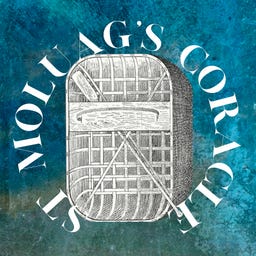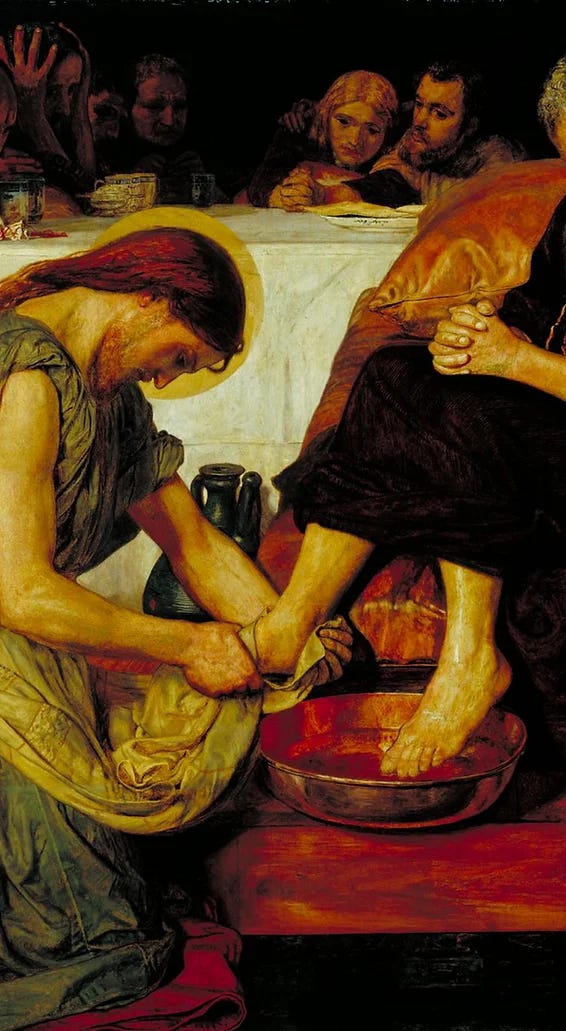The SNP Leadership Election and Mediaeval Philosophy.
Mediaeval tension in the SNP leadership race.
As I write this, Humza Yousaf has just won the leadership election for the Scottish National Party and will, in due course, be declared First Minister of Scotland. One of the most striking and yet unremarked features of the election was that the two leading candidates, among whom was the eventual winner, are committed members of monotheistic religions.
The contest undoubtedly did highlight issues relating to religious belief and its interaction with politics in a post-Christian society. But some of those issues are much older than the comparatively recent decline in organised religious practice. I found myself throughout much of the contest thinking about the Jewish, German-America political philosopher, Leo Strauss (1899-1973) and his discussion of Islamic, Jewish and Christian mediaeval political philosophy as an important source for the relationship between politics, religion and philosophy. Strauss remains a controversial figure in the US, but in the UK, certainly in academic philosophy, he is more likely to be ignored: a highly critical article by a British expert in Classical philosophy, Myles Burnyeat, dismissed him as ‘a Sphinx without a secret’ and as having ‘no discernible influence in Britain at all’. Although this was written in 1985, I think it’s still a fair assessment of his actual academic reputation in the UK, although I think this reputation is mistaken.
For present purposes, there is no need to decide on Strauss’ abilities: I am much more interested in his focus. In essence, his central point is, in the words of Thomas L. Pangle, that we need to ‘ceaselessly compel ourselves to encounter the challenge of profound modes of thought that do not share our modern assumptions’. In particular, for questions of politics, an important element of these ‘profound modes of thought’ is to be found in the mediaeval Latin-Christian, Judaic and Islamic traditions of political philosophy, which in turn built on the classical philosophy of Plato and Aristotle. If we do this, we will find a number of issues being highlighted which modernity tends to obscure. These issues will include the conflictual, but unavoidable nature of the relationship between philosophy, religion and politics.
A focus on the problematic relationship of religion and politics really ought not to need justification: during the SNP leadership contest, this was only too apparent. Attempts to spell out thoughtful, reasoned philosophical positions in both religious and political spaces are problematic. In religious spaces, they inevitably come up against the authorities of an institutional religion, that authority and its teaching based upon the certainties of revelation, as contrasted with the free exploration of the individual pursuit of wisdom. In political spaces, the need to speak to a wide variety of different people with different views and a limited capacity for rational debate again inevitably causes difficulties. However, for Strauss and the mediaeval thinkers he turns to for illumination, the solution is not to wish away any of these three elements or to distort them by forcing them to adopt the character of one of their competitors, but rather to acknowledge the ultimate irresolvable nature of these tensions. To bring this back to present day Scotland, it is not at all surprising that candidates with a strong religious faith find it difficult to express the values of those faiths, still less their deeper philosophical underpinnings, in a political space of soundbites and ratings grabbing outrage. There might be ways of ameliorating these tensions, but there is no way of avoiding them entirely.
Catholics should need little encouragement to find much of the above of immediate interest. The Middle Ages, as the high point of Latin Christendom, unavoidably exercise a disproportionate claim on our imaginations. Scottish Catholics in particular are surrounded by the ruins, literal and metaphorical, of a once glorious, and now romanticised, mediaeval kingdom. More generally, the intellectual edifice of Scholasticism, especially in the form of the theological philosophy of St Thomas Aquinas remains of intellectual importance to us and to many others. But with this compelling vision come its own dangers: if we once had this Cockaigne of a perfect, frictionless polity, why do we need to seek insights from a babble of conflicting mediaeval voices rather than going ad fontes themselves? Why go to Strauss rather than not directly to Aquinas? The answer to that lies partly in the nature of modernity in Scotland, and partly in the nature of the nature of that original mediaeval synthesis. Whatever we might learn from the mediaeval thinkers, we do not live in that mediaeval period: there is a greater variability and diversity in Scotland, not least from the decline in the social and political influence of Catholicism or even Calvinism. So our (and Strauss’) understanding of the clashes between religion, politics and philosophy will not be exactly those of the mediaeval period, and our application of the lessons learned from those clashes cannot be either. But emphasising more strongly the actual polyphonic nature of discussions in the Middle Ages is both a better preparation for the diversity of late modernity, and also a better preparation for Catholicism in knowing how to deal with it.
Put simply then, what might be the main lessons we learn if, following Strauss, we look back at mediaeval thinkers such as Al-Farabi (c.870-951) and Maimonides (1138-1204), both of whom are heavily influenced by Plato? Here are some possibilities. Philosophy -by which we roughly mean the individual pursuit of wisdom wherever it leads us- is an essential pursuit for human well-being, but will only be performed by few. They will live in jeopardy in both religious worlds and political ones, and will communicate their teachings in ways in which, when expressed publicly, will make use of obscure language and expression to conceal their content from many, but allow some to pick up their intent. Anyone watching politicians and others trying to be honest about what they believe whilst at the same time finding a form of words that does not trigger a Twitter mob will sense the difficulty here. Religion will express great truths in a symbolic form suitable for more people than philosophy, but may also express truths that go beyond philosophy and rely on revelation. In either case, there will be a tension with philosophy and politics, on the one hand by the need to impose institutional religious authority on spheres which naturally reject it, but also because of the failure of those spheres to acknowledge their own limitations. The tendency in modern Scotland, particularly in its media, to focus only on the most trivial daily business of party politics, rather than the permanent things which underlie and ultimately challenge them, reveals this difficulty. Finally, religion, as involving in part at least a faith commitment to revealed truth, does have difficulty in engaging with politics, particularly in its modern, democratic form. Essentially, if we have a variety of opinions within a society, firmly held, but not easily open to the sort of quick, superficial challenge that modern politics inevitably involves, there is a tension. However, that is a tension common to many viewpoints in the modern world, not just those of institutionalised religions. One lesson we can take from Strauss and his mediaeval sources is that such a tension cannot be wished away or driven out with force or ‘facts and evidence’, but instead has to be lived with uncomfortably through a variety of stratagems including reticence, an emphasis on civility rather than right think, and perhaps above all a recognition that perfection of this life is but an inadequate image of the life to come.
By Stephen Watt
Sources and further reading:
The quote from Thomas L. Pangle is taken from his introduction to:
Pangle, T.L. (ed.) (1989) The Rebirth of Classical Political Rationalism: An Introduction to the Thought of Leo Strauss, Chicago, The University of Chicago Press.
This collection of essays and lectures by Strauss is an excellent starting point to exploring his thought.
Myles Burnyeat’s essay, ‘Sphinx without a secret’, appeared in the 30 May 1985 issue of The New York Review. An archived version of this can be found here: https://archive.ph/v0Ls0
Online sources for further study of Strauss include:
Batnitzky, Leora, "Leo Strauss", The Stanford Encyclopedia of Philosophy (Summer 2021 Edition), (available online https://plato.stanford.edu/archives/sum2021/entries/strauss-leo/ ).
Priou, Alex (2023) ‘Leo Strauss and the possibility of political wisdom’, in Public Discourse, 22 March (available online https://www.thepublicdiscourse.com/2023/03/88012/?fbclid=IwAR19cRTSU5_jmTV2ur47-XsvDROw6XBxcnIURWQ1uyIwodsKdc64nWP8HOc ).
Servant Leadership Course: Begins 19th April
Led by Dr Sue Price, Director of Pastoral Outreach, Margaret Beaufort Institute of Theology and Eric Hanna, founder of Mary's Well and Editor of the online Scottish Catholic magazine; St Moluag's Coracle.
This will be a time of reflection, considering how the servant leadership model supports and develops parish ministries. Each session will last 1 hour, be reflective in its approach and will include some journaling homework.
Session 1: Apr 19, 2023 07:00 pm Online via zoom.
This session will introduce the idea of servant leadership, and that we are called to be Servants of God through our Baptismal Vocation of being Prophet, Priest and King.
Session 2: May 17, 2023 7:00 pm Online via zoom.
This session will use scripture to explore how as Servants of God, we need to listen to the still, small voice.
Session 3: Jun 21, 2023 7:00 pm Online via zoom.
In this session we will begin to explore the idea of a Servant-King and what that may mean for parishes.
Session 4: Sep 13, 2023 7:00 pm Online via zoom. In this session we will consider what it means to be Servant-Priests within a Parish.
Session 5: Oct 18, 2023 7:00 pm Online via zoom. This session will be considering what it means to be a Servant-Prophet within a parish setting.
Session 6: Nov 15, 2023 7:00 pm In person – led by Eric Hanna.
This session will be an evaluation of all that has been learnt through the previous sessions, an opportunity to re-new Baptismal vows and vocation of being called to be Servants of God as Prophets, Priests and Kings and a celebration. The in-person event will happen within the Highland Deanery of the Diocese of Aberdeen but for those who cannot make it due to distance or time we will set-up a camera so you can at least participate in some of it.
Cost:
You are asked to pay £8 per session for the five online sessions totalling a very reasonable £40 for the entire course. You can pay upfront or pay by month. The last session is in person and you will not be asked to pay for that.
To book:
Use the form below, or email: theteam@stmoluagscoracle.com. We will send you the relevant information and how to pay. Once we receive payment you will get a Zoom link.
Dr Sue Price: works for the Margaret Beaufort Institute of Theology in Cambridge. Her role as Director of Pastoral Outreach involves working with parishes and schools, providing training, retreats and input that supports their work and mission. For more information on the Margaret Beaufort Institute please follow the link.
https://www.mbit.cam.ac.uk/




